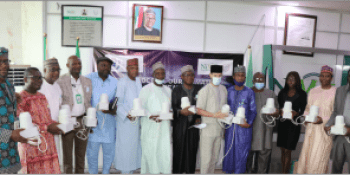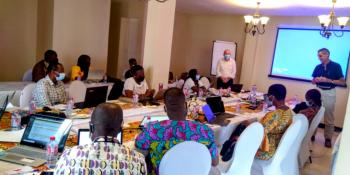Climate services for farmers: a learning journey through Mafoota, Jamaica
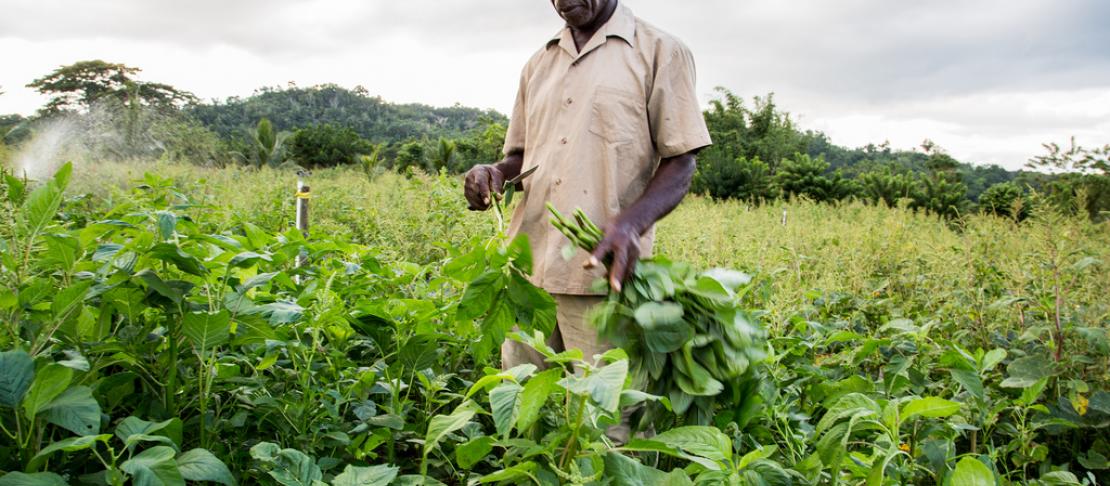
At a CCAFS-sponsored field tour, participants of the Third International Conference on Climate Services got a firsthand view of how Jamaican smallholder vegetable farmers struggle with drought risk, despite access to irrigation.
Ms. Joanne Smith is an expert grower of calaloo, a very tasty and high-protein vegetable grown in Mafoota, a small farming community in St. James Parish outside Montego Bay in Jamaica.
She harvests calaloo almost weekly from roughly 20 acres of land. When asked how this vegetable is cooked, she provided a quick demonstration and instruction on how it should be peeled, steamed, and savored with roasted breadfruit, boiled green bananas and dumplings for a real Jamaican-style breakfast.
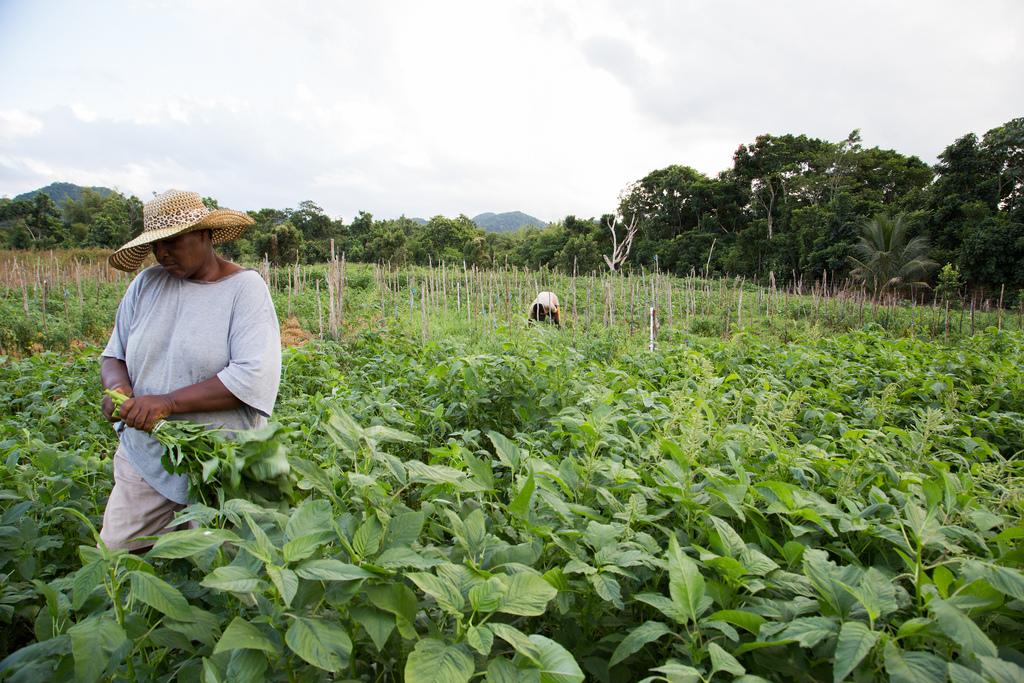
harvesting calaloo in Mafoota, Jamaica.
photo: F. Fiondella
Mrs. Smith’s fields are part of the Mafoota Farmers’ Cooperative, a community created in the 1970s by the Jamaican Government for the local farmers. Farms in Mafoota produce vegetables including romaine lettuce, cabbage, sweet potato, yam, bananas, plantains, scotch bonnet peppers, as well as the native calaloo. Mafoota farmers are experts in the production of vegetables, which are mainly sold to large chains of Montego Bay coastal hotels, in addition to local farm markets, sometimes at a better price.
A learning journey across Mafoota agricultural fields, organized by members of the Jamaican Rural Agricultural Development Agency (RADA) and sponsored by CCAFS; was part of the Third International Conference on Climate Services, held in Montego Bay, Jamaica, 4-6 December 2013.
Watch a video from the field trip in Mafoota, Jamaica:
Read our conference report back: Showing how climate services can work for smallholder farmers!
Program officer at RADA Elvis Grey led a group of international researchers and development practitioners across several vegetable fields to observe how local farmers produce their crops, and learn about their adaptive capacity and needs to sustain production.
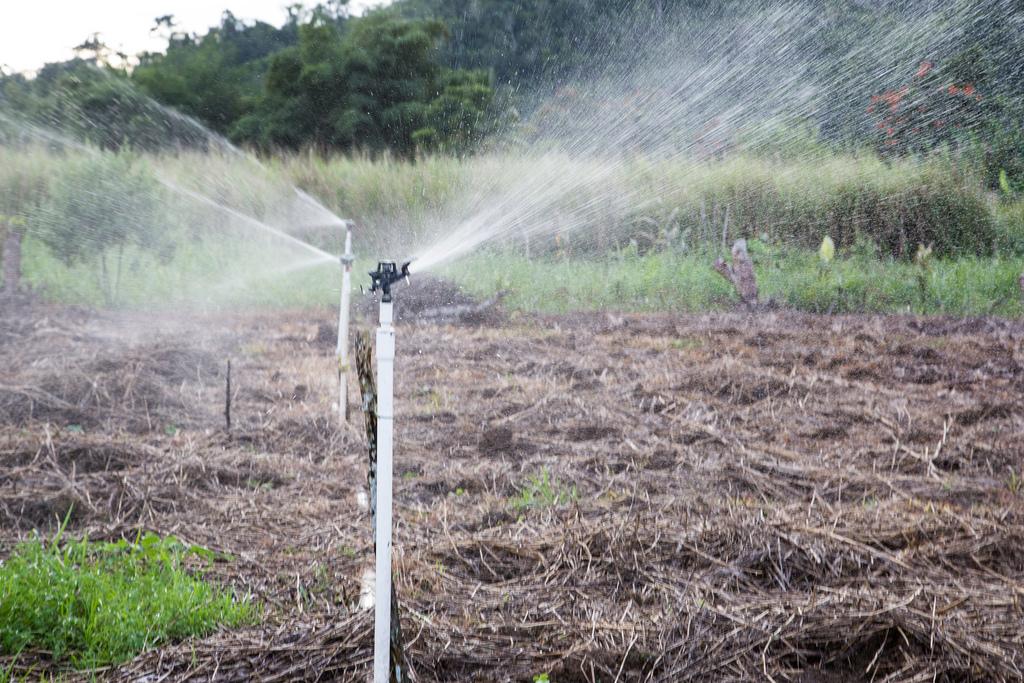
farmers in mafoota depend on the nearby river streams for irrigation. The increasing erratic rainfall however is leading to increasing droughts in the area. Photo: F. Fiondella
Mrs. Grace, as many of the other farmers now do, irrigates part of her farm to keep soil moisture and sustain a viable crop production throughout the year. However, irrigation is dependent on the flow of the local river stream and rainfall has been somewhat erratic in the past few years, leading to the stress of increasing droughts. These extreme climate events have shown local farmers that rivers can run dry and they need access to better information to act upon and adapt to increasing climate variability and change.
An example of a local adaptation measure in Mafoota is a large man-made water pond that pumps water from boreholes using solar power. This large irrigation pond, built 4 years ago with the support of the European Community and GEF funds, has luckily not been used so far; but if drought and other extreme events - including hurricanes - are to become more frequent, planning on how to manage water resources is key for a climate smart planning process in Mafoota. Therefore, there is an increasing need for actionable climate information to help make these decisions across the entire region.
Most farmers in Jamaica do not have access to agrometeorological information, but this is quickly changing. RADA officers, in partnership with the Meteorological Service of Jamaica and the newly created Ministry of Water, Land, Environment, and Climate Change, with the help of several international organizations, are starting to develop local climate information products to help farmers like Mrs. Grace with decisions such as when to plant, irrigate and spray for pests.
Rising food demand in countries like Jamaica, which are confronted with the impacts of climate change, means that climate-smart agricultural solutions are needed to increase food production while increasing its resilience to a variable and changing climate.
In the end, the recently held international climate change conference allowed participants from 35 countries to share current progress, challenges, and opportunities in climate services implementation, and foster discussions regarding the transition from pilot activities to sustained services.
Ana E. Bucher works as Climate Change Adaptation Specialist with the Climate Policy & Finance Department, World Bank


